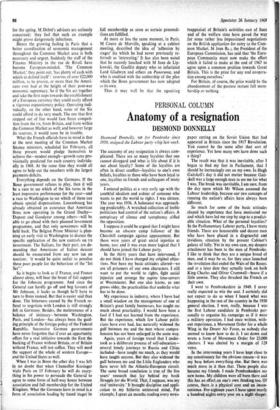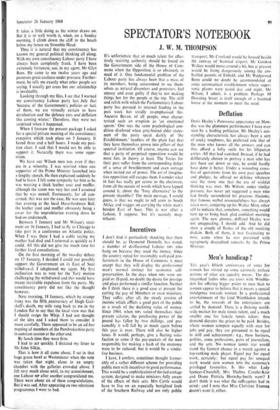Anatomy of a resignation
PERSONAL COLUMN DESMOND DONNELLY
Desmond Donnelly, MP for Pembroke since 1950, resigned the Labour party whip last week.
• The anatomy of any resignation is always com- plicated. There are so many loyalties that one cannot disregard and what is life about if it is not about loyalty? Some of the loyalties are Often in direct conflict—loyalties to one's own beliefs, loyalties to those who have been loyal to one, loyalties to friends and colleagues of many years.
I entered politics at a very early age with the youthful idealism and ardour of someone who wants to put the world to rights. I was sixteen. The year was 1936. A holocaust was approach- ing predictably. A wretched collection of feeble politicians had control of the nation's affairs. A conspiracy of silence and sycophancy stifled the opposition.
I suppose it could be argued that I might have become an obscure camp follower of the Churchill campaign against appeasement. But those were years of great social injustice at home, too; and it was even more logical that I should have joined the Labour party.
In the thirty years that have intervened, I do not think I have changed my original objec- tives. Nor have my basic attitudes altered—we are all prisoners of our own characters. I still want to put the world to rights, fight social injustice and scourge the supine time-servers at Westminster. But one also learns, as one grows older, the practicalities that underlie what has to be done.
My experience in industry, where I have had a small window on the management of one of Britain's great family businesses, has taught me much about practicality. I would have been a fool if I had not learned from the experience. But the experience, which few Labour politi- cians have ever had, has naturally widened the gulf between me and- the men whose compre- hension has not been enlarged in the same way.
Again, years of foreign travel that I under- took as a deliberate process of self-education- several lonely journeys to Russia and China included—have taught me much, as they would have taught anyone. But they also widened the gulf between me and the Little Englanders who have never left the Atlantic-European circuit. The same broad conclusion is true of the five years' research that lay behind my book Struggle for the World. That, I suppose, was my real 'university.' It brought discipline and appli- cation to my hitherto untutored mind. For example, I spent six months reading every news- paper cutting on the Soviet Union that had appeared in Britain since the 1917 Revolution. yim cannot be the same after that sort of experience. Yet how, many MPS have done such a thing?
The result was that it was inevitable, after I began to find my feet in Parliament, that I should be increasingly out on my own. In Hugh Gaitskell's day it did not matter because Gait- skell was a large enough man to see me for what I was. The break was inevitable, I am sure, from the day upon which Mr 'Wilson assumed the Labour leadership, because our two concepts of _running the nation's affairs have always been different.
So much for some of the basic attitudes _shaped by experience that have motivated me and which have led me step by step to a predict- able situation. What of the personal loyalties? In the Parliamentary Labour party, I have many friends. There are honourable and decent men who have been placed in a disgraceful and invidious situation by the present Cabinet's galaxy of folly. Yet in my own case, my deepest attachment has been to the men of Pembroke. I like to think that they are a unique breed of men, and it may be so, for they once launched the revolution that ended the Win of the Roses; and at a later date they actually took on both King Charles and Oliver Cromwell—brave if a little unwise. They also thrashed the French on their own.
I went to Pembrokeshire in 1949. I never really expected to win the seat. I certainly did not expect to do so when- I heard what was happening in the rest of the country in the 1950 general election. I won, really, because I was the first Labour candidate in Pembroke per- sonally to organise his campaign as if it were a military operation. I had once written, with- out experience, a Movement Order for a whole Wing in the Desert Air Force, as nobody else seemed to know how to do it. I sat down and wrote a form of Movement Order for 25,000 electors. I was elected by a margin of 129 votes.
In the intervening years I have kept close to my constituency for the obvious reason—it was my base before everything else.. But there was much more in it than that. These people also became my friends. I made Pembrokeshire my new home. My children were all born there and this has an effect on one's own thinking too. Of course, there is a physical cost and an incon- venience. For eighteen years I have spent nearly a hundred nights every year on a night sleeper. It takes a little doing as the winter draws on. But it is so well worth it, when, on a Sunday morning, I climb down the cliff to the beach below my house on Strumble Head.
Thus it is natural that my constituency has known my general political thinking all along.
With my own constituency Labour party I have always been completely frank. I have been extremely fortunate, too, in my agent, Mr Glyn Rees. He came to me twelve years ago and possesses great coolness under pressure. Further- more, he tells me exactly what other people are saying. I usually get cross but our relationship is invaluable.
Looking through my files, I see that I warned my constituency Labour party last July that 'because of the Government's policies or lack of them, we are virtually certain to have devaluation and the defence cuts and deflation this coming winter.' Therefore, they were not surprised when it happened.
When I foresaw the present package I asked for a special private meeting of the constituency executive which took place on 5 January. It lasted three and a half hours. I made my posi- tion clear. I said that I would not be able to support it. Naturally there was some oppo- sition.
We have our Wilson men too, even if they are in a minority. I was worried when one supporter of the Prime Minister launched into a lengthy speech. He then explained suddenly he had to leave. I felt some sympathy for him as he was wearing a thick leather coat and muffler, although the room was very hot and I assumed that he was unwell. Fortunately, for all con- cerned, this was not the case. He was seen later that evening at the local Haverfordwest Ball, the leather coat and muffler obviously being a cover for the unproletarian evening dress he had on underneath.
Between 5 January and Mr Wilson's state- ment on 16 January, I had to fly to Chicago to take part in.a conference on Atlantic policy. When! was there I had a cable saying my mother had died and I returned as quickly as I could. All this did not give me much time for further local consultations.
On the first morning of the two-day debate on 17 January, I decided I could not possibly support the Government on its East of Suez withdrawal. I telephoned my agent. My first inclination was to vote for the Tory motion challenging the withdrawal and this would have meant inevitable expulsion from the party. My constituency party did not like the thought however.
• Next morning, 18 January, which by strange irony was the fifth anniversary of Hugh Gait- skell's death, my wife rang back to me in my London flat to say that the local view was that I should resign the Whip. I had not thought of the idea and I asked them to consider it more carefully. There appeared to be an ad hoc meeting of members of the Pembrokeshire party in constant session at the other end.
By lunch time they were firm.
I had to act quickly. I dictated my letter to Mr John Silkin.
That is how it all came about. I sat in that huge green bowl at Westminster when the vote was taken that night, alone in an empty chamber with the galleries crowded above. I felt very much alone until, to my astonishment, one Labour MP after another congratulated me. There were about six of these congratulations. But it was sad. After appearing on two television programmes I went to bed.



































 Previous page
Previous page